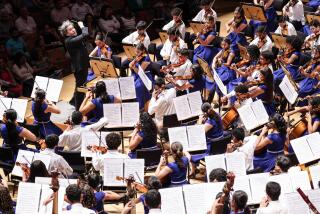Boys of Note
On an afternoon of thin, windy light, the empty room is filled with prayer--a woman’s voice droning out a Hail Mary over an imperfect P.A. system. Homeroom teachers are instructed to dismiss their carpoolers. For a moment, only silence surrounds the baby grand piano and blue plastic chairs, and brushes over the unlovely linoleum.
Then a bell clatters, a door opens, and the room is filled with boys. Big boys and little ones, skinny and solid, chattering, shoving, jumping, a whirlpool of boys, eddying about the director with wide-eyed questions and points of information--one wants to put a sleeping Furby on the piano, another has sprained his foot, books have been lost, music forgotten, parents want to know things. The noise rises, yo-yos appear and then the director moves forward.
“Gentlemen, the next yo-yo I see goes on the piano until the end of December,” he says, softly, firmly, and the yo-yos vanish. “Let’s take our seats,” and out of chaos struggles order, 20 boys pulling apart, moving toward the double-V of chairs. A tall boy enters, with spiky blond hair and the stooped, swinging walk of an athlete. His is the seat nearest the door.
“Quiet,” he says, and there is something approaching quiet. “Sit down,” he says, and most of them do.
The back door closes, and there is the warm grassy smell of boy, the whispery sound of arm-scratching and pocket-searching and general squirminess. A gentle command is given by the director, seconded less gently by the tall boy, and the boys stand, legs planted in white socks and wondrously large and complicated tennis shoes.
Then they sing.
Scales, simply scales, and yet the pure and rushing sound sweeps the everyday from the room and ushers in the sacred and the celebratory. And when they move from scales to the music, they open a small, clear window to heaven.
Because these boys, in their untucked white polo shirts and rumpled blue shorts, could be any boys, but they are in fact the Paulist Boy Choristers of California, one of just a handful of boys’ choirs in the country. The book lurking beneath each chair is Handel’s “Messiah,” unabridged, which they will sing, as they have for the last eight years, on Dec. 11 and 12, at St. Paul the Apostle Church in Westwood. After they have opened the Hollywood Christmas Parade with Little Richard on Thanksgiving Sunday, and have given a concert in Costa Mesa a few days later, and before they sing a holiday concert in Los Angeles on Dec. 20.
Understandably, Christmas is a high-volume time for a boys’ choir. Especially this choir. Like angels singing, some say, the purity in tone tempered by biology and innocence. Beyond emotion, or above it, it is an unblinking stare of a sound, impartial to its own beauty, 20 boy sopranos, now urging a rapid rise and fall of notes, now hanging upon the air one perfect chord.
Although culled from the student body of St. Paul the Apostle School, the Paulist Boy Choristers are not just a school chorus. With soundtrack credits (“Good Will Hunting,” “Oscar and Lucinda,” “Edward Scissorhands”); a new CD (Mahler’s Third Symphony with Esa-Pekka Salonen and the Los Angeles Philharmonic); gigs with the Philharmonic, the Los Angeles Master Chorale and the American Youth Symphony, and of course the occasional European tour, they’re a Los Angeles musical treasure.
*
That’s quite a standard for a group of 20, the eldest of which just turned 13.
“When I talk to prospective parents, I give them the November-December schedule,” director Dana Marsh says. “I want them to be aware of the level of commitment we need before the boys sign on.”
The word preceding “level of commitment” would be “high” or “total,” as in rehearsals four days a week. Two hours. Standing. Every once in a while, when he’s explaining a bit of music or giving them a breather, Marsh will say, “You may be seated,” and they collapse, like unstrung marionettes, onto their chairs. But when the chords are struck, they rise as if lifted, the stragglers admonished by the tall boy, or his dark-haired counterpart who has joined the rehearsal a bit late on the other side of the room.
Flanking the choirmaster, these two rebuke the noisy, the flagging, the inattentive. Pierce Maher and James Kim are seventh-graders, five-year veterans of the choir, and they rarely sit, even when it’s allowed.
“It’s easier to stay standing,” says Pierce, 13. “When I first joined the choir, that was the one thing that frightened me, all the standing. But now I’m used to it.”
“I can fall asleep standing,” says James, 12. “Sometimes during the ‘Messiah,’ I fall asleep. Not when we’re singing, during the other parts. And no one knows.”
He’s laughing, but it’s hard to tell whether he’s joking or not. Pierce shoots him a look, then covers, just in case.
“We’ve sung the ‘Messiah’ so many times,” he says, “it’s a part of us, it’s inside us.”
Both Pierce and James joined the choir when they were in second grade. Every year, Marsh tests boys in grades 2-4, looking for those with an ear for music.
Those chosen are invited to rehearsals. If they, and their parents, are up to the commitment, the newcomers join a junior choir and spend a year with associate director Russell Fox, who teaches them basic musicianship. They do not sing with the choir publicly until Marsh, Fox and voice coach Virginia Fox feel they are up to the task.
“They’ll work with you separately on music,” Pierce says. “They do that all the way through, even when you start performing, and then there’s summer training. . . .”
Two weeks. During summer vacation. There’s also a winter retreat in Lake Arrowhead. And the performances--Mozart in the spring, the Singing for Life benefit at Paramount, a summer concert. The soundtrack work, Marsh says, usually turns up at the last minute. Or not, as in the case of “Titanic,” for which the choir was supposed to sing until, the boys explain with a sense of eager irony only preteens could muster, director James Cameron decided they were too expensive.
“Yeah, right,” James says. “Like they couldn’t afford us.”
“It does take up a lot of time,” says Pierce, who also plays in club soccer. “Like tonight, we’ll get done here, I’ll go home, eat dinner, change, do 45 minutes of homework and then go to soccer for two hours.”
“Poor Pierce, overex-tend-ed,” singsongs Andrew Kahn, another seventh-grader.
Pierce smiles and ducks his head. He joined the choir, he says, because his parents wanted him to.
“Living the dream through you,” James says.
“But I’m really glad I did,” he says. “I feel like I’ve learned a lot about being a leader, helping the younger kids.”
That’s the kind of answer that always wins parental points, and it is one of the reasons his parents wanted him to join in the first place.
“He’s always been a very active and energetic kid,” says Tim Maher, Pierce’s father. “The choir is good at focusing his energies, and it’s good for him to be a little part of something big. He also,” Maher adds, “has a beautiful voice.”
James joined the choir because he thought it would be fun. The first few years, his mother says, were a bit of a shock for the whole family.
“We weren’t sure,” Vivian Kim says. “We thought, ‘Wow, this is too much.’ But James really, really likes it.”
So much so that when he transferred to another school last year, he decided to keep up with the choir, even though it meant logistical complications.
“He really wanted to stay,” Kim says, “and they wanted him too, since he is one of the most mature boys. But it is a lot of driving and dropping off.”
James is the only boy who doesn’t attend St. Paul’s, although technically, the choir is a separate institution, with its own board of directors and a separate $1,400 annual tuition (full and partial scholarships are available). Founded 30 years ago by Jon Wattenbarger to be a high-profile choir, it is based on the traditional English model.
“A choir of only boys’ voices is a relatively new invention,” Marsh says. “It started in Vienna as a way to raise money. Most choral music is written for boys and men.”
The Choristers sometimes perform alone, but more often in concert with a soloist or a men’s group. For the upcoming “Messiah,” they will sing with the Gentlemen of the Chapel Royal and four soloists.
*
“Pierce, Pierce,” says one of the younger boys, as they crowd around after one rehearsal, “tell about the gum.”
Pierce smiles at the floor, reluctant to seem disrespectful, but the opportunity is irresistible.
“This one soloist,” he says, “she was chewing gum during rehearsal and when it was her turn to sing, she just hands it to James. Just hands it to him. It was pretty funny.”
Clearly, as the wild laughter of the crowd illustrates. Two-hundred-watt boy energy bounces around the room, irrepressible, seemingly unharnessable. Yet in little more than a week, they will struggle into their blue blazers and ties and create what local critics annually agree is the most miraculous “Messiah” performed in Los Angeles, then turn around and sing a full concert of traditional Christmas music. No Frosty, no Rudolph. The real stuff.
And during this rehearsal, they make it clear that some of the pieces, especially “Lo How a Rose E’er Blooming,” should be sung only by a boys’ choir. Even one that has a clear-cut case of the pre-holiday fidgets.
“I feel like I’m losing some of you,” says Marsh, glancing at Pierce’s side of the choir. Instantly, the whispering and slouching ceases. They move onto “Good King Wenceslaus,” for which Pierce and another boy are tapped to sing solos. But when his moment comes, Pierce can’t hit the notes. After a second attempt, hands fly up and Marsh selects another boy whose tones are high and true.
“I get too nervous sometimes,” Pierce says later. “My throat closes up and my knees shake. It’s weird.” He shakes his head--he has, after all, been singing publicly for a few years now. “Sometimes it’s fine. But I know if I can’t get it in rehearsal, I don’t have a prayer on stage.
“It didn’t used to bother me so much,” he adds. “But this is my last year . . . “ His voice trails off as he looks around the room.
The voice of the boy soprano--it is a fleet sound, and short-lived--a boy soprano peaks at 11 or 12 and breaks within a year. And for Pierce, this is that year.
“Yeah, Mrs. Fox says my voice is lowering,” he says. “But some boys go gradually. I’m hoping mine holds out for a little while longer.”
There is no room for an alto or a tenor in a boys’ choir. And although some boys continue singing in school and community groups after their voices change, many do not.
“Their new voice is a completely different instrument,” Marsh says. “They have to learn to use it all over again. Some decide to take a break for a while.
“But,” he adds, “they all seem to retain an appreciation for the music. And they remain lifelong friends, because they have shared an experience that is impossible to describe to someone who wasn’t involved.”
A chance to sing like the angels. If only for a little while.



